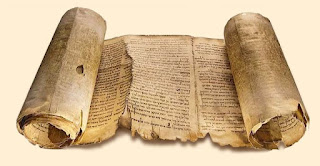If you read the Bible, not as "a" book, but as a collection of books, which it undeniably is, then the need to explain away contradictions disappears. Or at least the need becomes less urgent.
Most of the New Testament outside the Gospels is credited to the Apostle Paul, while the Old Testament has a more diverse cast. What Christians call the Old Testament can be divided in a number of ways. There's the torah, the Law, the first five books; there's the prophets; and there's the other writings which include books of alleged history as well as "poetic" books like Psalms and Proverbs. The first five books are traditionally credited to Moses, Psalms to King David, Proverbs, Ecclesiastes & The Song of Solomon to King Solomon. The various books of the prophets usually are considered eponymous. Various others round out the team.
The first book, is called Genesis by Christians, or Bereshith in Hebrew. Although it is included as part of "The Law", it actually is comprised of a creation myth and a legendary account of the origins of the people of Israel. This is not unusual, most cultures have, or had, creation myths and legends about the foundation of their nations. Within Genesis you'll find many of what we think of as "Bible stories": Adam & Eve, Cain & Abel, Noah's Ark, Abraham almost sacrificing his son, Sodom and Gomorrah and Lot's wife turning into a pillar of salt and finally Joseph and his family's sojourn in Egypt. It is self-evidently a book written to a for a specific tribal group, the Hebrews. Most of the Hebrew Bible does not read as universally applicable either. So how did it become part of the holy book of the Christians?
Things were a bit jumbled in Christianity's early days.
Although Jesus in the Gospels quotes the Old Testament, and refers to "the scriptures", and his follower Paul does the same, some Christians noted that there was a stark difference in how God was portrayed between the Old and New Testaments, almost as if they weren't the same God. Some went beyond the "as if" and declared unambiguously that they weren't the same god. Marcion was the most well known and influential of these. He completely rejected the entire Old Testament as being about an evil God of this world, while Jesus represented the "true" God. He was the first to compile a "canon of scripture" which viewed Paul as the ultimate authority. His "New Testament" included the epistles of Paul and the Gospel of Luke, all heavily edited to remove theology that Marcion did not approve of. Although Marcionite Christianity was later condemned as a heresy, Marcionite Christian churches at one time outnumbered Orthodox/Catholic churches. Christianity could have very easily become a brand new thing, totally divorced from the culture and religion from which it sprang.
But during Christianity's early days there was a Roman cultural bias toward religions that were "ancient" and a suspicion, if not an outright prohibition, of new religious movements. Christianity got around this by claiming the Old Testament as its own. Sections of it were reinterpreted as prophesies of the Messiah in ways that would have (and did) surprise Jews then and now. By piggybacking this new faith on the ancient religion of the Jews, the Christians could have the best of both worlds.
Start at the beginning: Part I
Go to: Part III

No comments:
Post a Comment